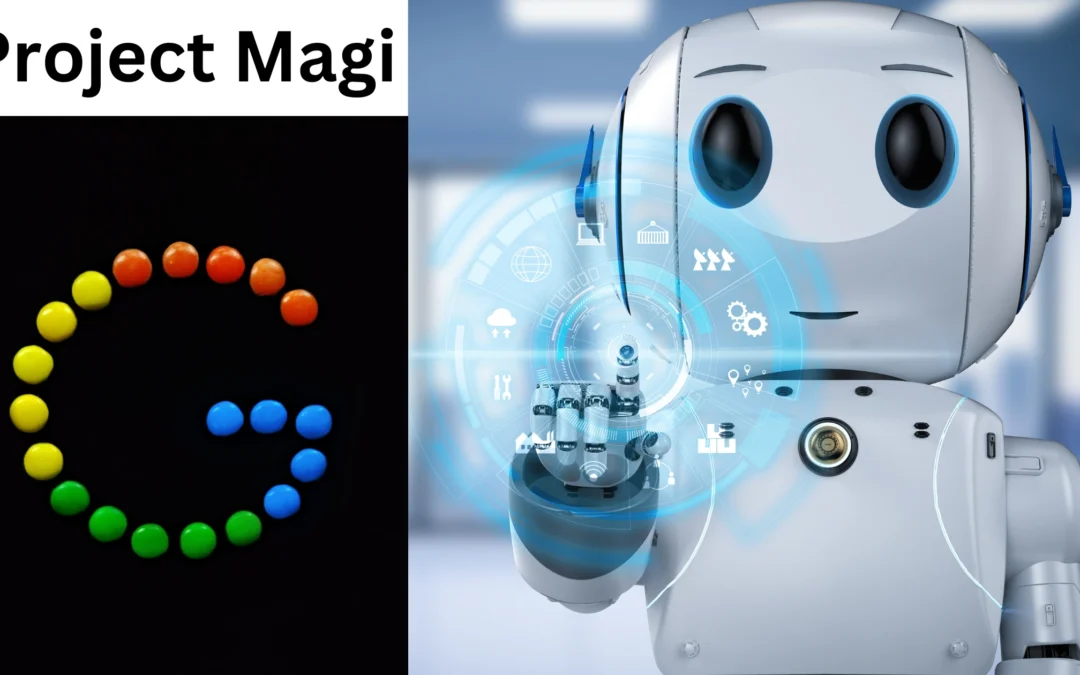In a recent announcement, Google announced a new initiative called Project Magi, which aims to transform internet search completely. Project Magi is a new artificially intelligent search engine that Google has developed over the past few years. It is expected to replace Google Search entirely when it eventually launches to the public.
According to the Search Engine Land Project, Magi has been developing since at least 2019 under Google Senior Vice President Prabhakar Raghavan. However, details still need to be available on exactly how Magi will work and what features it will offer users. With Magi, you can conduct natural, conversational searches using cutting-edge AI technology.
The goal is to move beyond the traditional search box and ten blue links model for which Google Search is known. With this new Project, users can query the search engine using natural language questions and have an actual conversation with the AI system. It could dramatically improve the ability to find helpful information online compared to keyword-based searches.
Conversational AI Capabilities of Project Magi
Advanced natural language processing and conversational AI are at the core of Project Magi’s capabilities. According to sources, the system can understand complete sentences, questions, and commands. It will interpret the context and intent behind the user’s asking rather than just picking out keywords.
It will enable a much more natural back-and-forth interaction with the search engine. You can ask follow-up questions to dig deeper and clarify your needs. The AI assistant will learn about your interests over time and provide personalized results catered to you.
The conversational interface is expected to feel more like chatting with a knowledgeable friend than a search engine. It could make finding information online feel more natural and efficient than hunting for the right keywords to plug into a search box.
Early Stage Development
Project Magi is still in the early stages of development at Google. It was launched in May 2023 in a trial limited to 1 million users in the United States [1]. If the initial problem goes well, Google plans to expand the test to 30 million users by the end of 2023.
Raghavan leads a team of over 160 employees actively working on developing this Project [1]. Given the massive scale of Google’s search engine, completely transitioning to an AI-powered conversational model is an enormous undertaking. It will likely take years of development before Magi is ready for a full public launch.
Combating the Competition
The competition Google faces in the search market is one of the driving forces behind Project Magi. While Google Search has dominated for decades, rivals like Microsoft’s Bing have started rolling out more advanced AI features. Startups focusing specifically on AI search, like Anthropic and You.com, also pose a threat.
By innovating with technology like this Project, Google aims to maintain its lead in the vital search engine space that is the gateway to the internet for so many. If competitors beat them to launching more capable AI search engines, it could undermine Google’s dominance. The stakes are high for Google to execute the ambitious vision for Magi successfully.
A Search Revolution
If fully realized, this Project can ultimately change how people interact with the internet. Search engines may feel more like assistants than merely retrieving links and snippets of information. The ability to have an intelligent dialogue could enable more efficient, in-depth, and rewarding searches for users.
Of course, a conversational AI system also comes with risks like providing inaccurate, biased, or inappropriate information. Google must carefully test Project Magi to ensure the AI delivers helpful search experiences. But if successfully implemented, Magi could be Google’s next revolutionary product, similar to how Google Search disrupted the early internet decades ago.
The launch of Project Magi is still likely years away. But it offers an exciting glimpse into how artificial intelligence could reshape information discovery online. Google is aiming high by trying to completely reimagine search from the ground up rather than just enhancing the existing model. If Google succeeds, Project Magi could completely change how we access information and interact with the internet.
Potential Risks of Conversational AI Systems:
- Providing inaccurate or misleading information – Since the system is generating its responses, there is a risk it could be mistaken or biased, potentially spreading misinformation. Extensive testing is needed.
- Security and privacy vulnerabilities – Like any AI system, hackers could exploit conversational agents or have unintentional data breaches. Protecting user data is critical.
- Biased and inappropriate responses – AI systems reflect the data they are trained on. They can inherit human biases and give offensive answers without proper safeguards.
- Over-reliance on AI – If users treat the conversational agent as an infallible source of truth, it could lead to failure to think critically and verify information.
- Job disruption – Intelligent assistants like Magi could disrupt fields like customer service and research that involve answering user questions. Economic impacts need consideration.
- Difficult to control at scale – Once launched widely, it becomes challenging for Google to monitor and edit problematic responses generated autonomously by the AI.
- Misuse by bad actors – Conversational AI could be misused to spread hate, bots, scams, and other harmful content if not properly governed.
Overall, conversational AI has enormous potential but also carries risks. Google must robustly test Project Magi and implement ethical AI practices to mitigate these risks as much as possible before full-scale deployment. Responsible design is vital to realizing benefits while minimizing harm.
FAQs
Q: What is Project Magi?
A: It is an artificial intelligence-powered conversational search engine currently being developed by Google. It aims to understand natural language questions and provide more relevant and personalized search results than traditional keyword-based searches.
Q: When will Project Magi launch?
A: Google has not announced an official launch date for Project Magi. It is still in early-stage testing as of 2023. Based on job listings and beta tests, launch timeframes from 2024 to 2026 have been speculated. However, Google has not confirmed when Project Magi will be available to the broader public.
Q: How will Project Magi change search?
A: Project Magi is expected to enable a search that feels like a conversation with an intelligent assistant. Users can ask questions naturally and get tailored answers rather than just links and snippets. The AI will learn interests over time to provide more personalized recommendations. This could make search more efficient and intuitive.
Q: What technology powers Project Magi?
A: Project Magi leverages state-of-the-art natural language processing, conversational AI, and machine learning. This allows it to interpret text, understand context & intent, and improve through experience. Google has developed custom AI models like LaMDA to enable more natural conversations.
Q: Will Project Magi replace Google Search?
A: Yes, Project Magi will eventually replace Google Search. It represents a new paradigm for search at Google, moving beyond the traditional ten blue links. If the multi-year transition is successful, Magi will become Google’s next-generation search engine. Google Search, as we currently know it, would be phased out.

